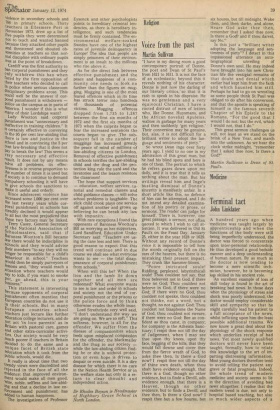Religion
Voice from the past
Martin Sullivan
"I have in my dining room a good contemporary portrait of Donne, the poet and Dean of St Paul's from 1621 to 1631. It is not the face of an ecclesiastic; beyond this it reveals nothing of his character. Donne is just now the darling of our literary critics: so that it is rash to speak in his dispraise. He was no gentleman and a very equivocal Christian. I have a rooted distrust of men of letters who, like Donne, Huysmans, and the African novelist Apuleius, wallow in garbage for many years and then suddenly 'get religion.' Their conversion may be genuine, but, alas, it is not difficult for a brilliant writer to adopt the language and sentiments of piety."
So wrote Dean Inge over forty years ago. I yield to no one in my admiration of this great man, but he had his blind spots and here is one of them. The portrait to which he refers gazes down upon me daily, and it is true that it tells us nothing about the man. But his writings reveal him and Inge's bustling dismissal of Donne's sincerity is manifestly unfair. In a short article like this, no defence of him can be attempted, and I do not intend any detailed examination of his poetry or prose, or sermons. The reader can judge for himself. There is, however, one great passage, a sermon, not often quoted to which I wish to call attention. It was delivered in Old St Paul's on the Feast Day, January 25, either in the year 1628 or 1629. Without any record of Donne's voice it is impossible to tell how the words originally fell on the ears of the hearers, but there is no mistaking their present impact. They crash like hammer-blows.
"Poore intricated soule! Riddling, perplexed, labyrinthicall soule! Thou couldest not say, that thou beleevest not in God, if there were no God; Thou couldest not beleeve in God, if there were no God; If there were no God, thou couldest not speake, thou couldest not thinke, not a word, not a thought, no not against God; Thou couldest not blaspheme the Name of God, thou couldest not sweare, if there were no God: Bee as confident as thou canst, in company; for company is the Atheists Sanctuary; I respit thee not till the day of Judgement, when I may see thee upon thy knees, upon thy face, begging of the hills, that they would fall downe and cover thee from the fierce wrath of God, to aske thee then, Is there a God now? I respit thee not till the day of thine own death, when thou shalt have evidence enough, that there is a God, though no other evidence, but to finde a Devill, adn evidence enough, that there is a Heaven, though no other evidence, but to finde a Devil], and thee then, Is there a God now? I respit thee but a few houres, but six houres, but till midnight. Wake then; and then darke, and alone, Heare God aske thee then, remember that I asked thee now, Is there a God? and if thou darest, say No."
Is this just a "brilliant writer adopting the language and sentiments of piety"? I detect in this impassioned utterance an auto
biographical unveiling of Donne's own soul. He may indeed have brought into his new Christian life the vestigial remains of that doubt and denial which earlier had kept him from the faith and which haunted him still. Perhaps he had to go on wrestling as some people think St Paul was obliged to do after his conversion, and that the apostle is speaking of himself in the famous seventh Chapter of his Epistle to the Romans, "For the good that I would I do not: but the evil, which I would not, that I do."
This great sermon challenges us still, not least as we stand on the brink of a New Year, and march into the unknown. As we hear the clock strike midnight, "remember that I asked thee now, Is there a God?"
Martin Sullivan is Dean of St. Paul's.


































 Previous page
Previous page